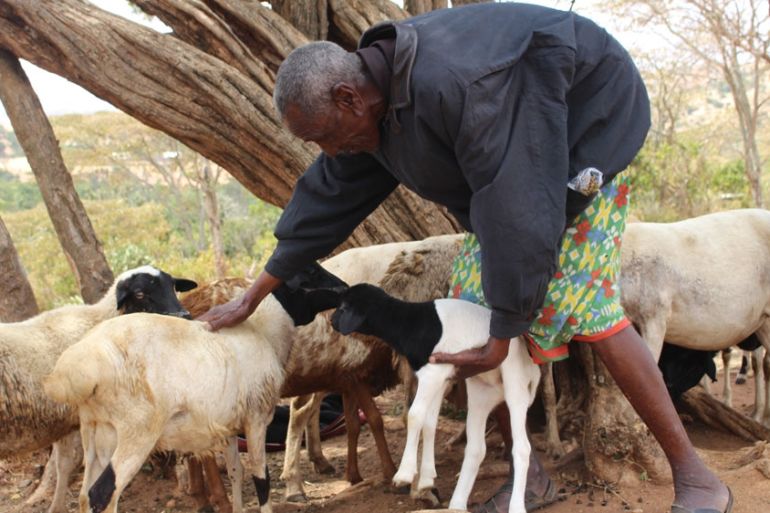Kenyan tribe readies for the death of its native tongue
Fewer than 10 elders speak Yakunte, a language native to Kenya’s Yaaku people that the UN has classified as ‘extinct’.

Doldol, Kenya – Rashid Njapaa bends down to check on a newborn sheep.
It’s a windy Saturday morning and the father of seven, dressed in a faded, navy track jacket and printed yellow sarong, is walking amid the livestock outside his modest home.
Keep reading
list of 4 itemsPortrait by Gustav Klimt sells for $32m at Vienna auction
UK returns looted Ghana artefacts on loan after 150 years
Fire engulfs iconic stock exchange building in Denmark’s Copenhagen
Njapaa shouts to one of his grandchildren, who herds goats and sheep all day around Doldol, a small village about 250km from the Kenyan capital, Nairobi.
“Prepare yourself to herd these goats and sheep! Make sure you bring them back on time!” he shouts upon seeing his grandson was lazing around. Normally, the livestock would have left early.
Despite going about his daily routine, Njapaa is a deeply distressed man.
A member of the Yaaku tribe of Kenya’s Rift Valley, the 78-year-old is one of seven people who can still speak the group’s native language, Yakunte. All the remaining Yakunte speakers are over the age of 70.
“It’s disturbing to see that young people who are supposed to take over from us have decided to abandon this beautiful language,” said Njapaa, chewing khat, a flowering plant and mild narcotic chewed by many East Africans.
“Where are we heading?”
History of assimilation
The Yaaku, a name which translates to the hunting people, migrated from Ethiopia to the caves and hills of the Mukogodo forest in Kenya’s Rift Valley more than a century ago.
There, they began to hunt and keep bees; honey is the staple food in their diet.
At the beginning of the last century, the Maasai, a Kenyan warrior tribe and one of the largest pastoral communities in East Africa, were looking for places to settle after white settlers took their land.
They chose to resettle in the Mukogodo forest and lived alongside the Yaaku, with whom they began trading.
But due to the Yaaku’s small population and lesser wealth, the Maasai saw their new neighbours as inferior, calling them Ntorobo, meaning “poor people with no livestock”.
Njapaa, the old man, said there were about 20 Yaaku people in his village when he was born.
The Yaaku began assimilating into the Maasai community and subsequently adopted the Maa language spoken by the Maasai to ease communication.
“That’s when our language started dwindling slowly,” Njapaa said.
Numbering only about 4,000 people in Kenya today, the Yaaku are considered a sub-clan of the Maasai by the Kenyan government.
Njapaa said he tried to teach his children Yakunte since they were kids, but to no avail. Today, all of them use the Maasai language.
That is a common thing among younger generations of Yaaku, who are largely uninterested in learning a language that so few can speak, said Ngaine Kitarpei, 34, who has volunteered in efforts to save the community’s language and culture.
“Many young Yaaku men and women ask us, who would [we] speak to? To them, Maasai language is easy and they communicate with it daily,” Kitarpei, a father of three who cannot construct a single sentence in Yakunte, told Al Jazeera.
Reviving Yakunte?
One-third of the world’s languages come from sub-Saharan Africa, UN world heritage group UNESCO estimates.
The organisation says as much as 10 percent of the over 2,000 languages spoken in the African countries may disappear within the next 100 years.
In 2010, UNESCO released a report of the world languages in danger. Yaaku is among 6 Kenyan languages listed as extinct. The others are Elmolo, Kinare, Kore, Lorkoti and Sogoo.
Local attempts to revive the language have struggled to get off the ground.
Manasseh Ole Matunge, a 52-year-old priest in Doldol, has tried to convince young people in the village to learn Yakunte while the elders are still alive.
“If these old men die, that would be the end of this language,” said Matunge, a father of five whose grandmother was one of only two women in the village who spoke the language fluently before her death in 2010.
“Our generation and future ones will live to know that once upon a time there was a language called Yakunte,” Matunge said.
In 2010, he started a cultural group to bring young people and the few fluent Yakunte speakers that are left together and published a small dictionary of Yakunte words and phrases translated into Kiswahili and Maasai.
But little has come out of his efforts.
“At this point, we have done everything,” Matunge told Al Jazeera.
“I think it’s high time we accept that our language is dead and continue speaking our neighbour’s language.”
Maarten Mous, a professor of African linguistics at Leiden University in the Netherlands who has extensively studied the Yaaku people, said it is impossible for the community to revive the dying language in its original form.
A more realistic goal, he said, would be to incorporate Yakunte words into the more widely used Maasai language.
“Continue to speak Maasai but reshape some of the words; bring in your old remembered words from the swallowed language,” Mous advised.
However, as the world observes International Mother Language Day on February 21, an annual event that celebrates multilingualism and language rights, Yakunte speakers like Njapaa have lost hope.
“My ancestors must be disappointed in us,” he said.
“We did not protect our language at all. We chose to speak that of our neighbours and forgot ours.”
Follow Osman Mohamed Osman on Twitter: @OsmanReport